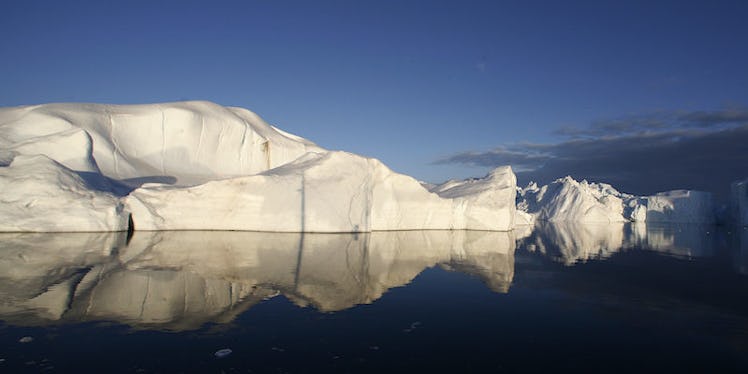
Global Warming Could Actually Be Changing The Way The World Spins
New research conducted by NASA suggests global warming could be altering the Earth's rotation.
According to The Guardian, scientists utilized NASA's two Gravity Recovery and Climate Experiment (GRACE) satellites to determine the axis on which the Earth rotates shifted toward the east.
They attributed this shift to a change in the distribution of mass on Earth caused by melting ice sheets, especially in Greenland.
Greenland is reportedly losing an average of over 287 billion tons of ice a year, and Antarctica is currently losing 134 billion tons of ice a year.
The losses in mass reportedly caused the Earth's wobble, or polar motion, to slightly change.
NASA researcher Surendra Adhikari explained,
If we lose mass from the Greenland ice sheet, we are essentially putting mass elsewhere. And as we redistribute the mass, the spin axis tends to find a new direction. And that's what we mean by polar motion.
The shift in polar motion means the locations of the North and South Poles changed as well.
Previous research has shown over the last 115 years, the North Pole moved around 7 to 8 centimeters annually toward Canada.
But, the NASA study states the North Pole began moving in the year 2000 toward the United Kingdom and Europe.
The study did not attribute a direct cause to the change in the distribution of mass, but it appears climate change factors are at least partially responsible.
Adhikari estimated the melting ice sheets in Greenland have caused 40 percent of the change in polar motion compared to 25 percent caused by Antarctica.
Another 25 percent, Adhikari said, is due to changes in continental water storage, though it's unclear what caused these particular changes.
Possible explanations include an increasing amount of droughts, which may be caused by global warming, or an increase in mankind's removal of water from the Earth.
While the study did not name any potential outcomes of the Earth's new rotation, it does show the tremendous effects humanity and climate change can have on the planet's physical stability.
NASA's revelation comes a few weeks after a pair of scientists concluded melting ice sheets could cause sea levels to rise several feet by the end of the century.
According to those scientists, if mankind does not curb its emissions of greenhouse gases, some of the world's most populous cities could be in danger of drowning.
The NASA study was originally published in the journal Science Advances.
Citations: Melting ice sheets changing the way the Earth wobbles on its axis, says Nasa (The Guardian), Greenland and Antarctic melt isn't just raising seas — it's changing the Earth's rotation (The Washington Post)